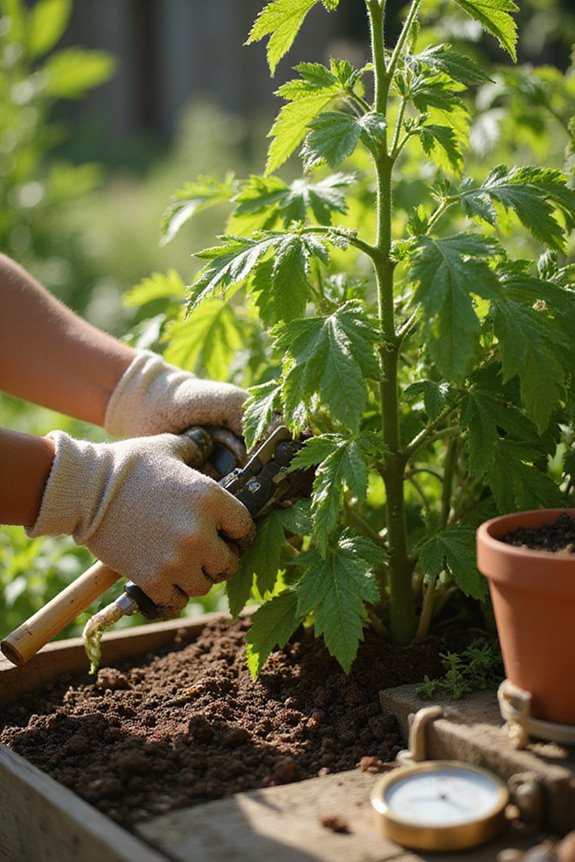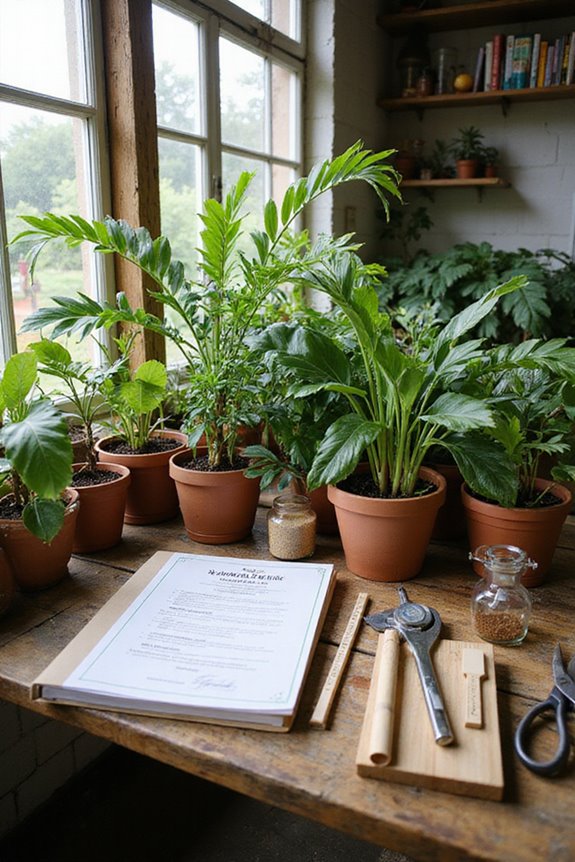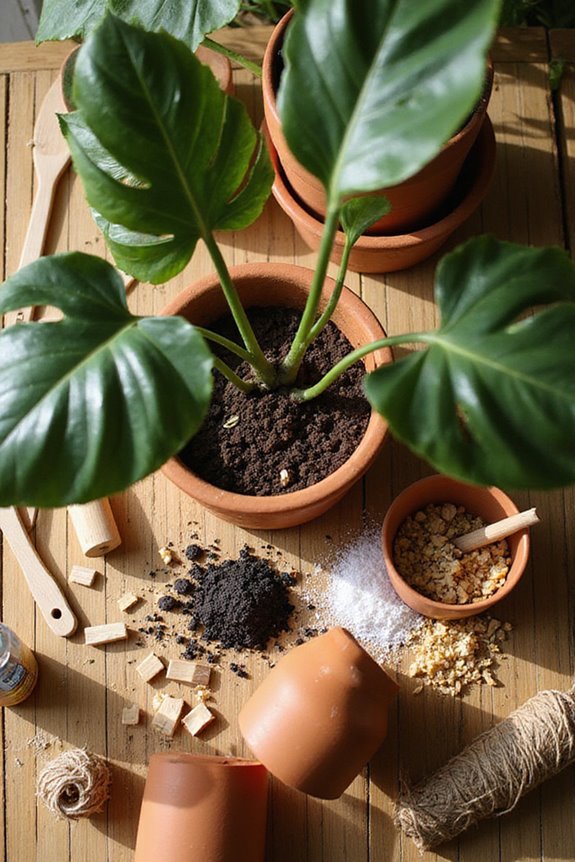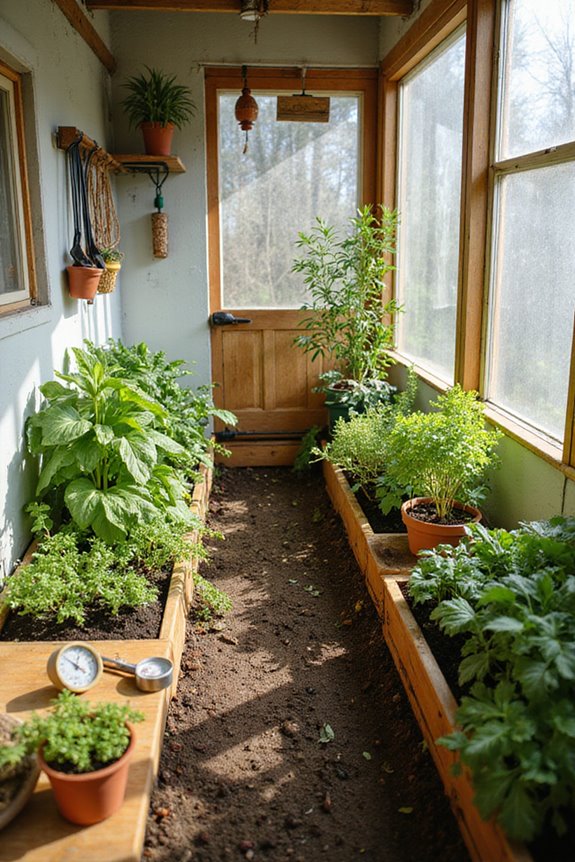Precision plant care techniques improve farming by using modern technology. We employ methods like precision irrigation, which uses drip systems to deliver water directly to plant roots, ensuring efficient water use. Additionally, precision planting utilizes GPS for accurate seed placement, enhancing growth. We analyze data for better decision-making, predicting crop needs and optimizing fertilizers. These techniques lead to healthier crops and more sustainable practices. There are various tools and benefits we can explore further.
Key Takeaways
- Precision planting technologies use GPS and sensors for automated seed placement, improving germination rates and crop consistency.
- Variable Rate Technology (VRT) customizes fertilizer application based on specific field needs, enhancing nutrient efficiency.
- Advanced irrigation techniques, like drip and micro sprinklers, deliver precise water amounts, reducing usage by up to 30% without sacrificing yield.
- Data-driven decision making utilizes historical and real-time data to optimize planting schedules and predict crop yields.
- Remote sensing technology aids in early detection of crop health issues, enabling timely interventions for better plant care.
Overview of Precision Plant Care
As we explore precision plant care, it’s important to understand how modern technology transforms farming practices. By using advanced techniques, we can notably improve plant health and optimize crop monitoring. Here are some key aspects:
- Accurate Seed Placement: Precision planting guarantees seeds are placed at the right depth and spacing, leading to better root systems and stronger plants.
- Variable Rate Technology (VRT): This application customizes inputs like fertilizers based on specific field needs, enhancing overall crop productivity.
- Remote Sensing: Drones and satellite imagery help us monitor crop health, allowing for early detection of issues such as pests or nutrient deficiencies.
Through these innovative methods, we’re enhancing our ability to care for plants and achieve sustainable farming goals together.
Precision Irrigation Techniques
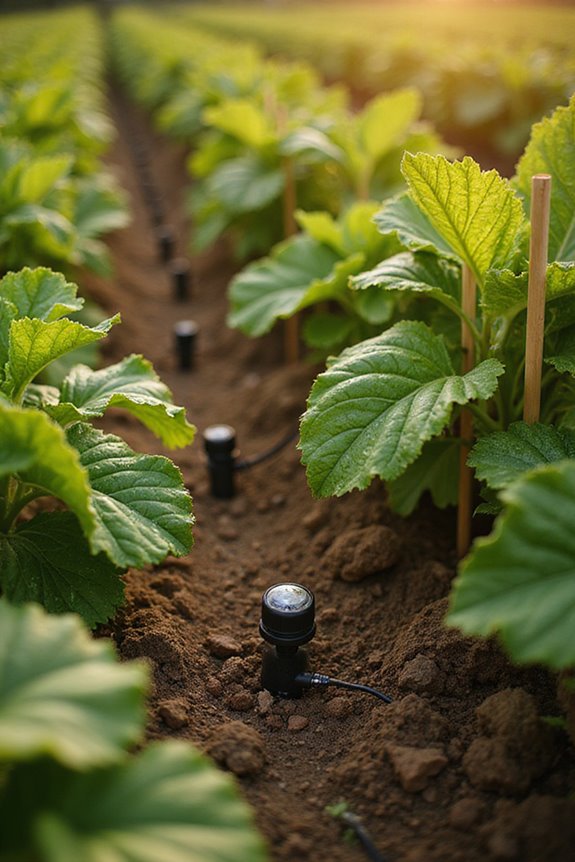
Precision irrigation techniques play an essential role in modern farming, ensuring crops receive the right amount of water when they need it. By using methods like drip irrigation, we deliver water directly to the root zone, enhancing efficiency. Micro sprinklers are another effective option, providing precise water volumes ideal for orchards and vineyards.
These techniques rely on real-time data from soil moisture sensors and weather stations. This integration allows us to automate irrigation schedules, reducing waste and improving responsiveness.
With precision irrigation, we can reduce total water usage by up to 30%, while still maintaining healthy crop yields. Ultimately, these methods promote sustainable farming, conserving water and supporting plant health in an efficient manner.
Precision Planting Technologies
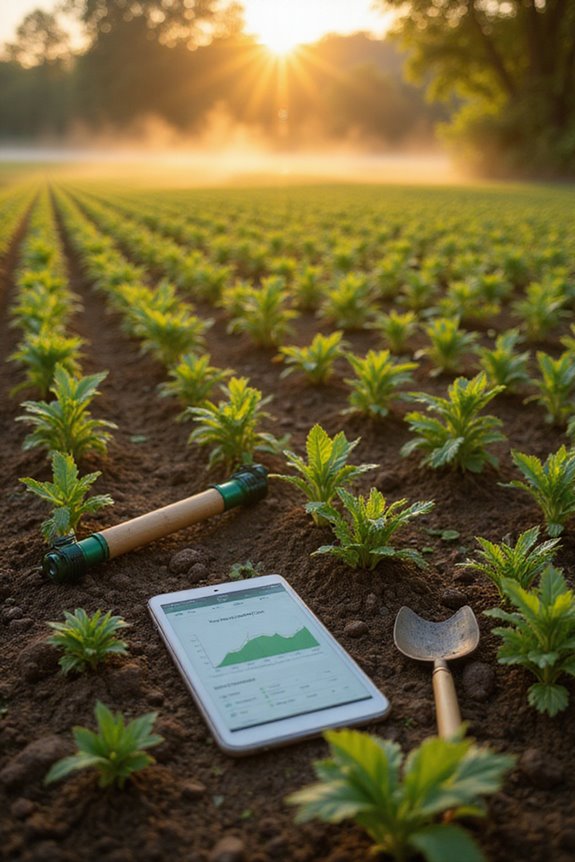
In today’s farming landscape, 80% of growers are turning to precision planting technologies to enhance their crop production. These innovations leverage GPS and sensor technologies for automated planting. By using variable rate technology, we can adjust seed and fertilizer application based on specific field conditions. This means we’re applying inputs only where they’re needed, reducing waste and costs.
Real-time monitoring through sensors helps us track soil health and plant needs. For instance, we can measure chlorophyll levels and water status instantly. Additionally, modern planters equipped with automated controls guarantee accurate seed placement, improving germination rates. Together, these advancements support more efficient and sustainable farming practices, making us part of a community dedicated to optimizing crop yields.
Data-Driven Decision Making
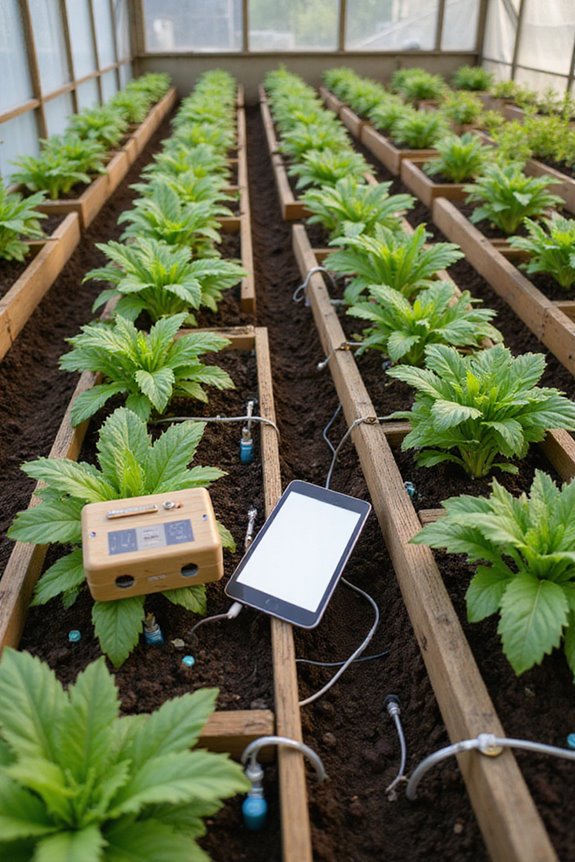
Data-driven decision making is transforming how we approach farming. By using data analytics, we can leverage historical crop yield records and environmental data to make informed choices. This helps us predict future outputs and optimize our planting and harvesting schedules. For instance, weather forecasts combined with current field conditions allow us to time our fertilization perfectly.
Additionally, crop forecasting relies on predictive models that use real-time data to anticipate growth conditions. This way, we can detect pests early and adjust irrigation schedules to minimize water stress. Overall, these data-driven strategies not only enhance our crop yields but also help us manage costs effectively. By working together with data, we can achieve better results for our farms and the environment.
Tools Used in Precision Plant Care
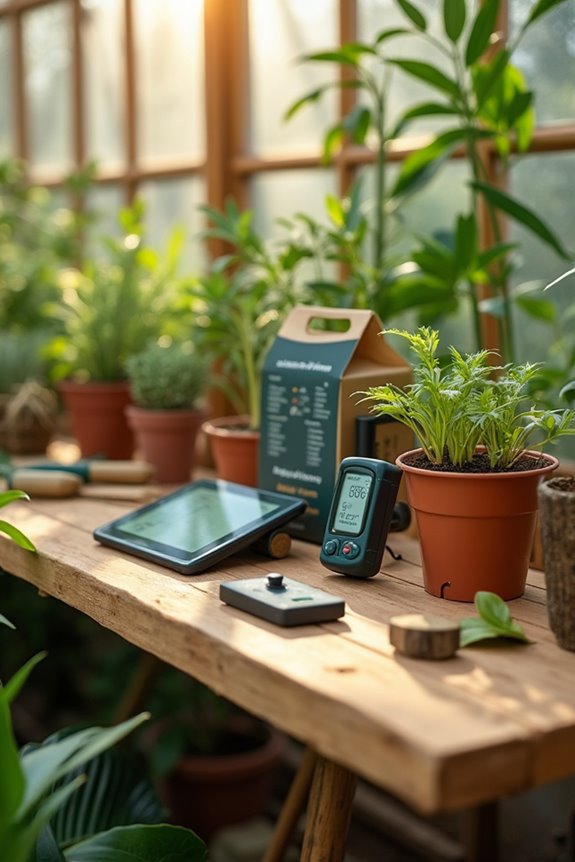
As we harness the power of data analytics in farming, the tools we use in precision plant care play a significant role in enhancing our practices.
- Precision Monitoring Tools
- 20|20 Technology provides real-time insights on field conditions.
- FlowSense monitors fertilizer application rates to guarantee consistency.
- SpeedTube and BullsEye maintain accurate seed spacing.
- Floating Singulator prevents double seeds, guaranteeing proper singulation.
- Conceal Fertility Attachment places fertilizer precisely near seeds.
- Variable Rates technology allows adjustments based on field data.
- DeltaForce enables row-by-row adjustments for ideal seed depth.
- Remote Row Cleaner Adjustments fine-tune residue management efficiently.
With these advancements, we’re ready to improve our planting practices together.
Benefits of Precision Plant Care
Precision plant care offers numerous benefits that can greatly enhance farming outcomes. First, it notably boosts crop optimization. By optimizing seed placement and input application, we can achieve higher yields and better overall crop quality.
Next, we experience improved resource management. With precision techniques, we minimize waste and reduce input costs, leading to greater efficiency in our operations. For example, variable rate applications of fertilizers guarantee that each part of the field gets exactly what it needs.
Lastly, these advancements lead to enhanced profitability. Higher yields combined with lower costs result in improved net income. By adopting precision plant care, we can work smarter, not harder, assuring sustainability and success for our farms. Embracing these techniques truly makes a difference in our agricultural practices.
Environmental Impact of Precision Techniques
The environmental impact of precision techniques in agriculture is significant and multifaceted. By implementing sustainable practices, we reduce greenhouse gas emissions. For instance, precision plant care minimizes fertilizer overuse, lowering nitrous oxide emissions.
- Water Use Efficiency
- Precision irrigation saves water, preserving essential resources.
- Accurate nutrient application prevents soil depletion, enhancing fertility.
- Targeted pesticide use safeguards non-target species like pollinators.
These methods not only improve yields but also contribute to long-term environmental benefits. By using data-driven practices, we limit land clearing and promote carbon sequestration. Overall, embracing precision techniques helps us foster a healthier planet while ensuring sustainable agricultural productivity.
Future Trends in Precision Agriculture
Looking ahead, we can expect significant advancements in precision agriculture that will reshape farming practices. AI advancements will drive predictive farming, offering tailored advice on planting and irrigation. With machine learning, we’ll monitor crop health in real-time, allowing early intervention to reduce losses.
Robotic automation will take center stage, with drones and ground robots performing tasks like soil sampling and targeted spraying. This minimizes human intervention and reduces labor costs.
As we embrace integrated systems, GPS and sensor technology will unify data, enhancing decision-making. Satellite imagery will support efficient irrigation and fertilization, pinpointing local issues.
Together, these innovations will optimize our farming practices, enabling us to grow smarter and more sustainably.
Frequently Asked Questions
How Much Does Precision Plant Care Technology Cost?
When we commence our farming journey, understanding the cost factors of precision plant care technology investments becomes essential. Initial expenses can hover around $122,000, yet the rewards often bloom beautifully in yield and savings.
What Crops Benefit Most From Precision Plant Care Techniques?
We understand corn hybridization thrives with precision techniques, ensuring ideal soil moisture management. Together, we can enhance our yields and protect our crops, making a positive impact on our agricultural community and the environment.
Is Precision Plant Care Suitable for Small-Scale Farms?
Absolutely, precision plant care’s suitable for small-scale farms. It offers small scale benefits through cost effectiveness, helping us reduce waste and optimize resources, ensuring we thrive together while protecting our environment and enhancing our yields.
How Can Farmers Get Started With Precision Plant Care?
Did you know that precision agriculture can boost yields by up to 20%? To get started, we should focus on data collection and soil analysis, ensuring we grasp our fields’ needs for effective management.
What Are Common Challenges Faced in Implementing Precision Agriculture?
We recognize that implementing precision agriculture brings challenges like data integration and technology adoption. It’s essential we address concerns about costs, training, and compatibility, fostering a supportive community to navigate these hurdles together.

